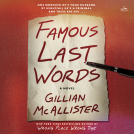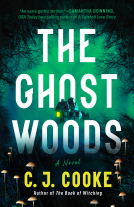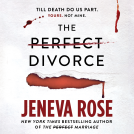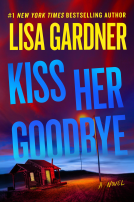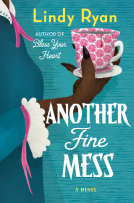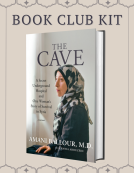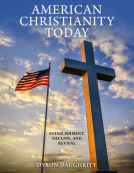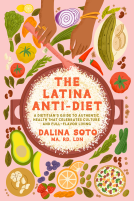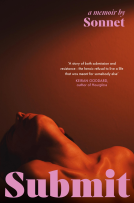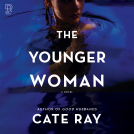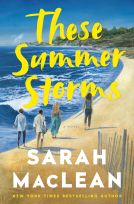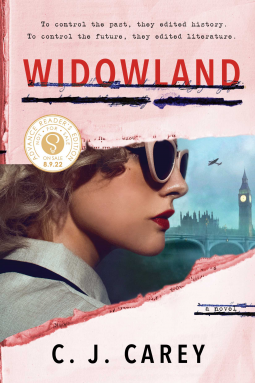
Widowland
A Novel
by C. J. Carey
This title was previously available on NetGalley and is now archived.
Send NetGalley books directly to your Kindle or Kindle app
1
To read on a Kindle or Kindle app, please add kindle@netgalley.com as an approved email address to receive files in your Amazon account. Click here for step-by-step instructions.
2
Also find your Kindle email address within your Amazon account, and enter it here.
Pub Date Aug 09 2022 | Archive Date Jul 22 2023
SOURCEBOOKS Landmark | Sourcebooks Landmark
Description
THE PHILIP K. DICK AWARD NOMINEE
"Widowland is a compulsive, terrifying read."—Kate Quinn, New York Times bestselling author of The Rose Code
For readers of Margaret Atwood's The Handmaid's Tale and Philip K. Dick's The Man in the High Castle comes a thrilling feminist dystopian novel set in an alternative history that terrifyingly imagines what a British alliance with Germany would look like if the Nazis had won WWII.
To control the past, they edited history. To control the future, they edited literature.
LONDON, 1953. Thirteen years have passed since England surrendered to the Nazis and formed a Grand Alliance with Germany. It was forced to adopt many of its oppressive ideologies, one of which was the strict classification of women into hierarchical groups based on the perceived value they brought to society.
Rose Ransom, a member of the privileged Geli class, remembers life from before the war but knows better than to let it show. She works for the Ministry of Culture, rewriting the classics of English literature to ensure there are no subversive thoughts that will give women any ideas.
Outbreaks of insurgency have been seen across the country with graffiti made up of seditious lines from forbidden works by women painted on public buildings. Suspicion has fallen on Widowland, the run-down slums where childless women over fifty have been banished. Rose is given the dangerous task of infiltrating Widowland to find the source of the rebellion before the Leader arrives in England for the Coronation ceremony of King Edward VIII and Queen Wallis. Will Rose follow her instructions and uncover the criminals? Or will she fight for what she knows in her heart is right?
With wit, suspense, and sheer originality, C. J. Carey has crafted an eerie story of "what if" that explores how some systems of female control cherished by the Nazis would have developed in a German-occupied England.
Praise for Widowland:
"Brilliantly conceived and executed, Widowland is a mind-bender of a novel about the power of literature to change minds. I loved it!" —Mark Sullivan, bestselling author of The Last Green Valley and Beneath a Scarlet Sky
"Storytelling at its best! I rarely come across a book I can't put down but I devoured this one." —Rhys Bowen, New York Times bestselling author of two historical mystery series as well as several internationally bestselling historical novels
"An electrifying, Orwellian dystopia with a thrilling feminist twist. In Carey's expert hands, one can truly believe that literature can change the world." —Lara Prescott, New York Times bestselling author of The Secrets We Kept
"Tense, thought-provoking, and terrifying, Widowland is about a woman's search for truth in a world bent on destroying all traces of it." —Natalie Jenner, international bestselling author of The Jane Austen Society and Bloomsbury Girls
Available Editions
| EDITION | Other Format |
| ISBN | 9781728248448 |
| PRICE | $16.99 (USD) |
| PAGES | 432 |
Available on NetGalley
Featured Reviews
 Summer H, Educator
Summer H, Educator
This was the first book for me to read by these authors but definitely not my last!! The story and characters are so well developed and the book is beautifully written. This will stick with you long after you finish the book. Highly recommend!!!
 Rachel F, Reviewer
Rachel F, Reviewer
Widowland by C. J. Carey is a unique and entertaining dystopian and alternative history novel that gives us the insight into what if…
This novel is set in England and gives us the alternative history of what the world could look like if WWII never happened as it did. This book takes a few givens: Nazi control over England, a new and created society, segregation along not just race/religion, but also among gender and usefulness as decided by the new government.
Societal classes are enforced, and history is being rewritten by the victors.
Rose is a great character. Her quest is very unique and dare I say I was drawn to her personality and the fundamental concepts, decisions, and inner voice that were presented within this story.
I don’t want to give anything away, so I will just say I went into this with certain expectations, but the book delivered so much more…and with a side of attitude and flare. I was pleasantly surprised and definitely recommend it.
4/5 stars
Thank you NG and Sourcebooks Landmark for this wonderful arc and in return I am submitting my unbiased and voluntary review and opinion.
I am posting this review to my GR and Bookbub accounts immediately and will post it to my Amazon, Instagram, and B&N accounts upon publication on 8/6/22.
 Book Trade Professional 23650
Book Trade Professional 23650
A rich, challenging--and disturbing dystopian novel based on an absolutely fascinating premise and woven of gorgeously researched history. A truly provocative and unique read--Highly recommended!
Many thanks to Sourcebook and to Netgalley for the opportunity and the pleasure of the read.
 Reviewer 857287
Reviewer 857287
“Widowland” by CJ Carey is a dystopian book that asks a “what if” question - what if during WWII Britain had lost to Germany - what might’ve happened?
As others have noted, this book sparks a resemblance to “1984” and “The Handmaidens Tale,” and having read both of those books, I agree. Rewriting history is mentioned, along with not talking or “remembering” the Before Times, and how women - praised for being able to bear children - are second class, or worse, citizens. Reading is, for all intents and purposes, forbidden outside of school - but the only books to be read are those that have been modified by the government to enforce the ideal feminine traits.
I found the idea of this book very interesting - and I can see it being a popular book club book, especially with the discussion questions listed in the back. The world building I enjoyed - I liked the explanation of “how things worked” and found it rather interesting. I liked how, to throw in a “Hunger Games” reference, the lowest (poorest) people weren’t as downtrodden as believed by those not living in that segregated area. I enjoyed reading about the rewriting of history - not just news, but also literature, movies, and the like (thinking of a corrected “Casablanca” makes me think the entire movie wouldn’t be available). I also liked how, unlike in Hunger Games, the story was told with a main character who seemed to almost have it all - the privilege, the extended family - but inside was conflicted.
But somewhere around the 80% mark, things started falling flat for my enjoyment. I know that the story picks up around that point, but things seemed to move very quickly, but at the same time (at least to me) rather from left field. I do think I want to reread the book at another time, but I think it’s more to enjoy the world building and some of the literary mentions. I was a titch disappointed that Ms. Carey is working on a sequel - while I understand why the world was an interesting one to visit, but I hope that Rose’s story isn’t continued as I rather liked the ending as it stands. Maybe a further visit into Widowland? Speaking of Widowland, do read the Author’s Interview as she mentions how she came up with the title of the book.
 Kim W, Librarian
Kim W, Librarian
This book is slow to grab interest, but once past the first few chapters holds interest for the remainder of the gripping story. Loosely based on history, intrigue draws the reader in and leaves one hoping for a sequel.
Like Philip K. Dick's Man in the High Castle, Widowland imagines an alternate, horrifically dystopian world under Nazi Germany's authority. Rose Ransom is a "Geli," a member of the elite caste of women who possess the regime's idea of superior genetic qualities. She rewrites classic works of literature for the Ministry of Culture, an Orwellian agency created to ensure that art amplifies Nazi propaganda. Her role is to revise women characters who are too educated, intelligent, autonomous, or powerful. Twenty-nine, single, and without children, Rose's family is concerned she may be at risk of losing her high status. Most women her age are already at home with multiple children. Those stakes are hiked way up throughout the novel as she transforms her role in society into something more subversive, feminist, and dangerous, defying the expectations she has helped inject into the literary canon. Ultimately, this book follows a quiet, unassuming, bookish woman who manipulates sexist assumptions and leverages the widespread underestimation of women to tip the world on its axis. Five stars, so badass.
In this alternate history, the entire female population is classified into hierarchical order. Geli Girls are the most elite, Klaras are "fertile women who had produced, ideally, four or more children," professional women are Lenis, and women in caring professions are Paulas. Then come the Magda shop and factory workers, the Gretl houseworkers, and finally the Friedas, a nickname from "Friedhöfsfrauen—cemetery women. These were widows and spinsters over fifty who had no children and no reproductive purpose and who did not serve a man. There was nothing lower than that." A woman's classification determines everything from her profession, to her marriage options, to her calorie allocation: "2,613 for Gelis, 2,020 for Lenis, 2,006 for Magdas, Gretls 1,800, and Friedas, 879."
The Leader will be visiting soon and political graffiti (lines from forbidden works of literature written by women) keeps showing up in or near libraries. Ministry of Culture worker (classic texts "editor") Rose Ransom is sent on a top-secret mission to the Widowlands to flush out the rebels. There are hundreds of thousands of women in the Widowlands, every inch of the city is under constant surveillance and she is second-guessing everyone and everything she thought she knew.
This historical fiction novel was heavy on British and German history and it is easy to understand see how all that knowledge comes through in the text. Author C. J. Carey has also written "several novels under the name Jane Thynne, based around women in prewar and wartime Germany, with a particular focus on the way the regime dictated their daily lives." In the closing acknowledgments, I found the following line especially poignant: "Sowing division, turning citizens against each other, controlling the media, and restricting what people read are the skillsets of dictators everywhere." She also pointed out that "Although the setting is fictional, many figures in this novel existed, and the story is based on the genuine SS collection task force established by Alfred Rosenberg to loot Europe’s libraries for books between 1939 and 1945. Tens of millions of books were plundered from libraries in every country of Europe and brought back to several archives, including Rosenberg’s Amt Schrifttumspflege in Berlin. Rosenberg’s approach to controlling literature went far beyond book burnings, and the team he established aimed to adjust certain aspects of history to reflect National Socialist beliefs about the past."
I am now anxiously anticipating the sequel to Widowland, which the author confirmed is in production.
This book is a haunting reminder of our past, as well as where we could end up in the future if we aren’t careful to learn from it. Given the current situation in the United States, where books are being banned more than ever before, and women are being treated as second class citizens, this is a timely and terrifying look into the possibilities of a world filled with leaders seeking control above all else, while putting citizens against each other. I look forward to reading the sequel as soon as it’s available!
 Tammy B, Reviewer
Tammy B, Reviewer
Absolutely brilliant. This chillingly atmospheric alternative history is one of the best books I’ve read this year. Highly recommended.
Thanks to NetGalley for providing an ARC copy for my review.
 Mary Beth A, Librarian
Mary Beth A, Librarian
All I can say about Widowland is, wow. This book pulled me in from the first page, and I had trouble putting it down.
Widowland is an alternate history historical fiction, in a world where England created an "Alliance" with Germany in the 1930s. It is now the 1950s, and England is a protectorate of Germany. Women are sorted into castes, prescribing what jobs they can have, what clothes they can wear, how many calories they get each day, and who they can associate with. Most English men have been sent to the mainland to work (or have been killed for resisting), so young women often marry older men, and often German men (or become the mistresses of German men who are stationed in England). While Germans on the mainland live in luxury, the people of the protectorates live in deprivation for the most part. They still don't have access to sugar, butter, and other cooking and baking needs, the only clothing and shoes they have access to are cheap, and there are no extras, unless you are the highest caste.
Rose works in the Chamber of Culture. Her main job is rewriting classics to fit the German standards - women shouldn't think themselves above men, they shouldn't celebrate their own intelligence, no characters should question the government - to be used in the school curriculum. She also is having an affair with Martin, who is the Assistant Culture Minister. She is a Geli, the highest caste, and while her life is better than other women's lives, she is constantly on edge to make sure her behavior, clothing, and work measures up to the standards of the Germans. There are watchers everywhere, and you never know who will turn you in for a stray remark that could be deemed seditious.
The entire country is obsessed with the royal coronation that is coming up - Edward and Wallis will finally be crowned by the Leader. Rose is asked by the Culture Minister to investigate a spate of vandalism. Someone is painting quotes about feminism, education, and fighting tyranny on walls. First they appeared near a library in Oxford, then in other cities, mostly ones where the Leader will be visiting when he comes for the coronation.
Rose is sent to one of the Widowland complexes, where women who are past the age of reproduction and meaningful work are placed. They are in the lowest caste, the Friedas, and are all "known readers." The law says people can't discuss literature in groups larger than 3 persons, but the minister believes these women are flouting that rule, and trying to make the Protectorate look bad with this obscene grafitti. Her cover is that she is to interview the women about heritage and folk traditions for a book that Protector Rosenberg is writing about England. But really, she is to see if there is any evidence the women are behind the graffiti.
As Rose investigates, she notices her coworker Oliver always seems to be lurking around. Is her spying on her, or does he have his own agenda? Can she really live with herself if she reports on the Friedas she interviewed? Is this a world she wants her niece to grow up in? And is there anything she can do about it?
Like Margaret Atwood's A Handmaid's Tale, Widowland shows us what the world could look like if we (as a society) take a step in a different direction. While Carey uses the names of a lot of Nazi leaders, the words "Nazi" and "Hitler" never appear in this book, and Carey says in an interview that she did that deliberately to "convey the generic nature of an oppressive regime."
While this book is heavy and depressing in its subject matter, it also shows the strength of those who resist authoritarian governments and policies. The book includes the popular quotation - “Those who cannot remember the past are condemned to repeat it,” by George Santayana, and to me, this is why this book is so important. When you look at history, you see how authoritarian governments take over when people feel disenfranchised and powerless, and how some people are always looking for the easy way out if it means they don't lose their power (even if everyone else does). It is important to remember as we as a society debate the rights we afford our fellow man that when one of us loses a right, that is opening the door for someone to take a right that is important to us.
Thanks to Netgalley for the advance copy of this wonderful book.
Readers who liked this book also liked:
Publishers Lunch
General Fiction (Adult), Nonfiction (Adult), Teens & YA
